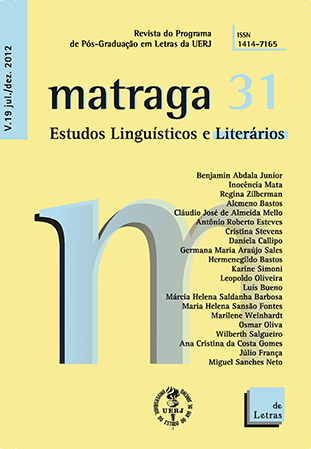HISTORY SET ADRIFT IN ‘AS NAUS’, BY LOBO ANTUNES: IDENTITY AND HISTORICAL CONSCIOUSNESS
Keywords:
Literature and History, Post-colonialism and post-modernism, contemporary Portuguese narrative.Abstract
The novel As naus (1988), by Antonio Lobo Antunes, dialogues with the history of Portugal incorporating in the theme and in the articulation of form an existing red-hot debate in the contemporary Portuguese society, whose tension is the problematic nature of national identity, due to the historical development of the country, in which there is the confront of the discourse of imperial greatness lost and the reality of economic decline. The novel can be read as a portrait of the disillusionment of a people who can no longer believe in redemptive myths and comes to anchor itself in a collective image, propitiating the individual’s feeling of belonging to a present that can not ignore the past, constructed by historical discourse - one that gave support to the myth of the imperial homeland. This relationship between past and present is permeated by a political dimension underlying the discussion of how the individual relates to the theme of loss of empire, finding himself in a country with a glorious history, whose idea of nation is sustained in the epic of heroic deeds, as opposed to a routine that belies it. In this process, the loss of illusions contributes to the renewed discussion of the nationalist ideal. The dialogue with history, articulated in fictional discourse, comes to show how this relationship permeates the composition of the narrative, especially by the confluence of the times in the story, expressing an inner conflict by discursive creativity, which can be read as a political instrument for questioning the hegemonic history.
Downloads
Downloads
Published
How to Cite
Issue
Section
License
Authorization
Matraga – Scientific Journal of the Post-graduate Program in Arts and Humanities of UERJ is authorized to publish the article submitted here, if it is accepted for online publication. It is attested that the contribution is original, that it is not being submitted to another publisher for publication, and that this statement is the expression of truth.
The works published in Matraga's virtual space – Scientific Journal of the Post-graduate Program in Arts and Humanities of UERJ will be automatically transferred, and your copyright is reserved to Matraga. Its reproduction, in whole or in part, is conditional on the citation of the authors and the data of the publication.

Matraga uses license Creative Commons - Attribution-Non-Commercial 4.0 International.





